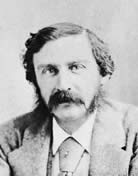|
|
 |
Bret Harte
(1836-1902)
Original name FRANCIS BRETT HARTE American writer who
helped create the local-colour school in American fiction.
Harte's family settled in New York City and Brooklyn in
1845. His education was spotty and irregular, but he inherited
a love of books and managed to get some verses published
at age 11. In 1854 he left for California and went into
mining country on a brief trip that legend has expanded
into a lengthy participation in, and intimate knowledge
of, camp life. In 1857 he was employed by the Northern
Californian, a weekly paper. There his support of Indians
and Mexicans proved unpopular; after a massacre of Indians
in 1860, which he editorially deplored, he found it advisable
to leave town.
Returning to San Francisco, he was married and began
to write for the Golden Era, which published the first
of his Condensed Novels, brilliant parodies of James
Fenimore Cooper, Charles Dickens, Victor Hugo, and others.
He then became a clerk in the U.S. branch mint, a job
that allowed freedom for editorship of the Californian,
for which he engaged Mark Twain to write weekly articles.
In 1868, after publishing a series of Spanish legends
akin to Washington Irving's Alhambra, he was named editor
of the Overland Monthly. For it he wrote "The Luck
of Roaring Camp" and "The Outcasts of Poker
Flat." Following The Luck of Roaring Camp, and
Other Sketches (1870), he found himself world famous.
He furthered his reputation with "Plain Language
from Truthful James" (1870), better known as "The
Heathen Chinee," a poem that attracted national
attention. On it he based his best play, Ah Sin (1877),
a collaboration with Twain.
Flushed with success, Harte in 1871 signed with The
Atlantic Monthly for $10,000 for 12 stories a year,
the highest figure offered an American writer up to
that time. Resigning a professorship at the University
of California, Harte left for the East, never to return.
In New England he was greeted as an equal by the writers
Henry Wadsworth Longfellow, James Russell Lowell, Oliver
Wendell Holmes, and William Dean Howells, and was lionized
and toasted to the point of spiritual and moral breakdown.
With personal and family difficulties, his work slumped.
After several years of indifferent success on the lecture
circuit, Harte in 1878 accepted consulships in Crefeld,
Ger., and later in Glasgow, Scot. In 1885 he retired
to London. His wife and family joined him at wide intervals,
but he never returned to the United States.
He found in England a ready audience for his tales
of a past or mythical California long after American
readers had tired of his formula. "Ingénue
of the Sierras" and "A Protégée
of Jack Hamlin's" (both 1893) are perhaps better
than his earlier stories.
|



